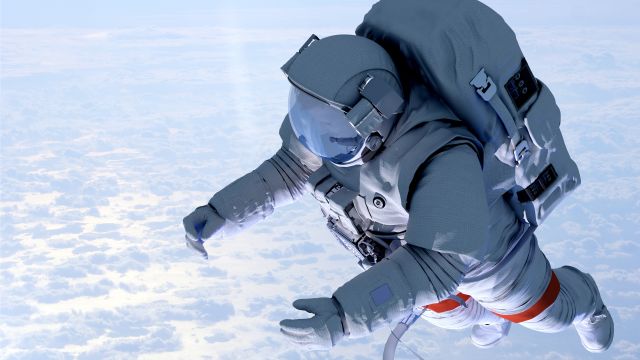Updated on July 3, 2024.
As more private companies begin selling rocket flights to members of the public, the dream of venturing into space has slowly become a reality for a select few people.
For starters, embarking on a commercial space flight can be very expensive. Space flight also requires a baseline level of fitness as well as rigorous preparation. This training is necessary because space exploration can have peculiar effects on our health. The prep for a short commercial flight lasting several minutes may require days or even weeks of training. Astronauts who travel further into space, meanwhile, typically prepare for years before they’re ready for liftoff.
Even during a short space trip, the effects on the human body can be profound. Here are seven surprising things that can happen.
You may experience dangerous radiation exposure
The Earth's atmosphere shields us from most cosmic radiation, such as the sun’s ultraviolet rays. That’s a good thing, since exposure can increase the risk of cardiovascular disease, central nervous system damage, cancer and more.
The good news is that space suits protect against ultraviolet radiation. Other space radiation, however, such as galactic cosmic radiation, can penetrate several centimeters of skin—and even through space suits and spaceship shielding material. One 2016 study published in Scientific Reports looked at astronauts from the Apollo missions of the late 1960s and early 1970s. It found that cosmic radiation caused blood vessel damage. The astronauts even demonstrated a higher cardiovascular mortality rate.
You may lose bone and muscle
An astronaut can lose more than 1 percent of their bone mass in a single month of space travel, thanks to decreased physical activity. This reduction begins just two or three days after liftoff. A space mission of 5 to 11 days can also cause a staggering 20 percent loss of muscle mass, according to NASA.
What’s more, it has been reported that such muscle degeneration can actually cause the heart to shrink. Astronaut Scott Kelly’s heart lost 27 percent of its size after he spent most of 2015 and part of 2016 on the International Space Station. (Don’t worry—he was ultimately fine.)
These losses make exercise especially important for astronauts, since it helps them avoid atrophy of bones and muscles. In fact, they typically work out for a whopping 150 minutes each day, using a variety of equipment specially designed for environments with very little gravity.
Astronauts also eat a diet rich in calcium and vitamin D to combat their increased risk of osteoporosis, a condition characterized by decreased bone density and porous bones.
Sleeping becomes a challenge
Due to new surroundings, long flight times, loud mechanical noise, and high stress, many astronauts experience disturbed sleep, sleep deprivation and long-lasting fatigue. They're often only able to get six hours of sleep each night, less than the seven to nine hours typically recommended.
Your behavior changes
Flying a spacecraft may sound like fun but being confined to such a small area can leave explorers feeling isolated, cramped, and stressed. The close quarters and potential for grievous error can hurt interpersonal relationships, too, making astronauts act irritably toward each other. This change in behavior can also carry over to Earth, which is one reason astronauts must receive psychological evaluations as part of their training.
Several studies dealing with mental health issues and space travel have suggested that interaction with space debris and other stressors puts astronauts at greater risk for developing psychiatric conditions. To deal with potential troubles, spaceships carry anti-anxiety and antipsychotic medications on board.
Vision could get worse
It’s believed that being in space causes pressure along the optic nerve, which can result in blurred vision and, in some cases, permanent damage to the eyes. One NASA survey of both short- and long-flight astronauts found that many had problems seeing things up close and far away during flights. For some, those issues persisted once they had returned to the ground.
In a separate, small study involving crew members from a long-term flight, NASA found the backs of some astronauts' eyeballs had flattened, in addition to other changes. The same thing was observed in a 2016 study of astronauts on the International Space Station. Two-thirds of the space travelers reported eye troubles, often the result of flattening.
Immune systems weaken and congestion increases
High levels of radiation, increased stress, confined spaces, and lack of gravity can increase allergy symptoms and the possibility of skin conditions, such as rashes. Some experts even theorize that longer missions could result in a heightened risk of infections or autoimmune problems down the road.
Not only does space change your immune system, but the air pressure inside the spacecraft can cause the fluids in your body to spread out and move toward your head. This could lead to a puffy face and congestion, which should return to normal once back on Earth.
Space makes you taller
If you feel short here on your home planet, consider taking a trip through the galaxy. Since gravity isn’t as strong in space, it allows your spine to relax and stretch instead of being pushed down, as it would on Earth. The result is temporary growth of about 3 percent of your actual height over a year, or about 2 inches for most adults. Before you get too excited, though, keep in mind that you'll go back to your original height when you return home.
Readjusting to Earth’s conditions after a trip to space isn’t easy. Recovering from the health effects of even a short journey takes a few days—and the longer you’re out there, the longer it takes to adjust to being back home.







